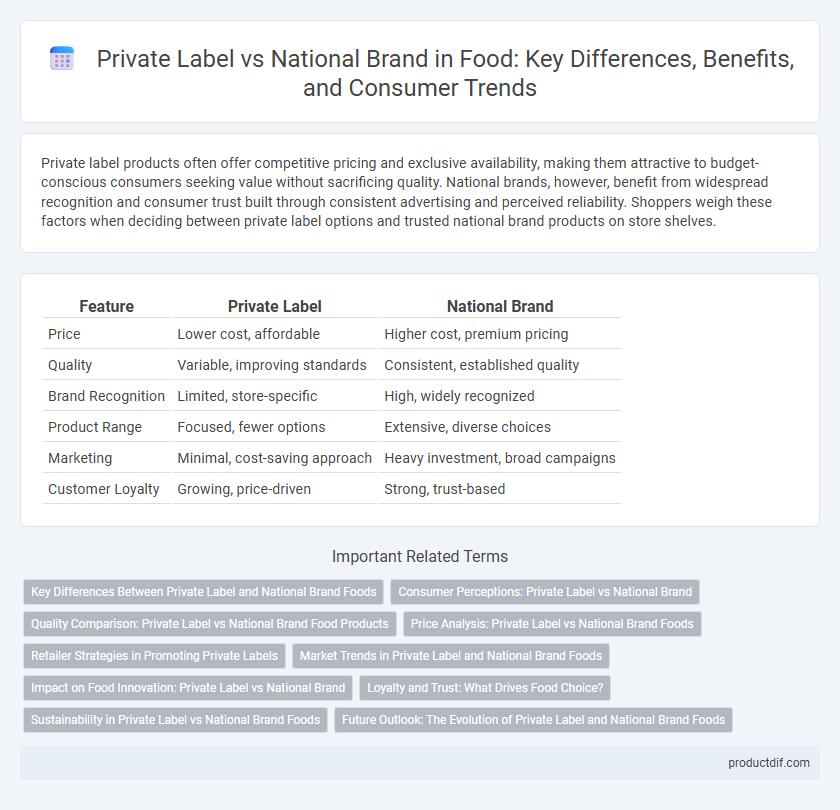Private label products often offer competitive pricing and exclusive availability, making them attractive to budget-conscious consumers seeking value without sacrificing quality. National brands, however, benefit from widespread recognition and consumer trust built through consistent advertising and perceived reliability. Shoppers weigh these factors when deciding between private label options and trusted national brand products on store shelves.
Table of Comparison
| Feature | Private Label | National Brand |
|---|---|---|
| Price | Lower cost, affordable | Higher cost, premium pricing |
| Quality | Variable, improving standards | Consistent, established quality |
| Brand Recognition | Limited, store-specific | High, widely recognized |
| Product Range | Focused, fewer options | Extensive, diverse choices |
| Marketing | Minimal, cost-saving approach | Heavy investment, broad campaigns |
| Customer Loyalty | Growing, price-driven | Strong, trust-based |
Key Differences Between Private Label and National Brand Foods
Private label foods are typically produced for retailers and sold under their brand, offering cost-effective options with competitive quality, while national brands are created by well-known manufacturers and emphasize widespread recognition and consistent quality. Private labels often provide higher profit margins for retailers and can be more adaptable to market trends, whereas national brands invest heavily in marketing and brand loyalty to maintain consumer trust. Consumers may perceive national brands as safer choices due to established reputations, but private labels gain traction by matching or surpassing quality at lower prices.
Consumer Perceptions: Private Label vs National Brand
Consumer perceptions of private label versus national brand products often center on quality, value, and trust. National brands are typically associated with consistent quality and strong brand loyalty, while private labels are perceived as cost-effective alternatives offering similar quality at lower prices. Shifts in consumer behavior due to increased confidence in private labels have led to growing market share and acceptance in mainstream retail.
Quality Comparison: Private Label vs National Brand Food Products
Private label food products have significantly improved in quality, often matching or exceeding that of national brands due to advancements in manufacturing processes and stringent quality controls. Numerous studies reveal consumers increasingly perceive private labels as reliable and sometimes fresher options, especially in categories like dairy, frozen foods, and snacks. National brands maintain an edge in consistent flavor profiles and brand trust, but private labels offer competitive ingredients and transparency, driving growing market share in quality-conscious segments.
Price Analysis: Private Label vs National Brand Foods
Private label foods typically offer lower price points compared to national brand foods, appealing to cost-conscious consumers without compromising quality. Price analysis reveals private labels can be 20-30% cheaper due to reduced marketing expenses and streamlined supply chains. National brands maintain higher prices driven by brand recognition, advertising investments, and perceived quality advantages.
Retailer Strategies in Promoting Private Labels
Retailers strategically promote private labels by emphasizing exclusivity, competitive pricing, and tailored product assortments to differentiate from national brands. Leveraging data-driven insights, retailers optimize shelf placement and targeted marketing campaigns to boost private label visibility and consumer loyalty. These strategies enhance profit margins while catering to evolving customer preferences for quality and value.
Market Trends in Private Label and National Brand Foods
Private label foods continue to capture significant market share due to increasing consumer demand for cost-effective and quality alternatives to national brands. Recent market trends highlight rapid innovation in private label product lines, emphasizing organic, plant-based, and sustainable options which rival national brands in variety and quality. Consumer preference data indicates growing trust in private labels, driven by retailers' strategic marketing and improved product transparency.
Impact on Food Innovation: Private Label vs National Brand
Private label brands drive food innovation by offering unique, cost-effective products tailored to consumer trends, often enabling faster market adaptation than national brands. National brands invest heavily in research and development, resulting in premium quality products with extensive marketing support that reinforces brand loyalty. The competition between private labels and national brands accelerates innovation cycles, broadening product variety and improving food quality across the market.
Loyalty and Trust: What Drives Food Choice?
Loyalty and trust significantly influence consumer food choices, with private labels gaining ground by offering competitive quality at lower prices, fostering strong shopper loyalty. National brands leverage established reputation and consistent quality, maintaining trust through recognized ingredients and proven safety standards. Consumer preference often hinges on perceived value, brand transparency, and past product experience, driving the dynamic between private label affordability and national brand reliability.
Sustainability in Private Label vs National Brand Foods
Private label foods often demonstrate greater commitment to sustainability by prioritizing eco-friendly packaging and sourcing local, organic ingredients compared to many national brands. National brand foods may rely more on established supply chains with less flexibility for rapid sustainable innovation, leading to higher carbon footprints. Consumer demand drives private label products to adopt transparent sustainability practices, enhancing their appeal in environmentally conscious markets.
Future Outlook: The Evolution of Private Label and National Brand Foods
Private label foods are projected to gain significant market share due to increasing consumer demand for affordable, high-quality products and retailer innovation in product development. National brands are evolving by integrating advanced digital marketing strategies, sustainability initiatives, and personalized nutrition to maintain brand loyalty. The future food industry will witness a synergistic competition where private labels leverage cost-efficiency and national brands emphasize unique value propositions.
Private label vs National brand Infographic

 productdif.com
productdif.com